8 Music Reviews
Cardinal, self-titled (Empyrean)
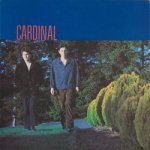
Cardinal's 1994 self-titled debut album – their only album – is considered a classic by some people, and deservedly so: it's a riveting mix of raw pop-rock with sophisticated arrangements. When Richard Davies of the rough psych-pop band The Moles left Australia, moved to New York, and hooked up with music-conservatory drop-out, would-be film soundtrack composer Eric Matthews to form Cardinal, the result did have a certain kind of magic that can only come when two talents with both shared sensibilities and conflicting sensibilities come together for something new. The resulting album was a beautiful balance between warped melody and absolute grace, producing a few absolutely perfect songs, the gorgeous ballad "You've Lost Me" chief among them in my mind. Empyrean's new re-issue of Cardinal both presents the album in pristine condition and expands it to tell the whole story of Cardinal. The group started out as a three-piece, with Bob Fay on drums, a fact that's unreflected in the proper album, which is mostly drum-less, filled instead with Matthews' harpsichord, marimba, organ, piano and trumpet in addition to the pair's guitars. This new reissue's 11 bonus tracks includes several rough tracks recorded when Fay was in the band (some released on the out-of-print Toy Bell EP in 1992, along with Davies and Matthews' demos for the album. The demos reveal something close listeners to the album already know: Cardinal's success wasn't just about the arrangements, there was magic in the songs themselves. The early tracks with Fay drive home another fact, that this band had serious psychedelic leanings. Those inclinations towards mystery, present but subtle on most of the album proper, are worn on the trio's sleeves on songs like the very '60s "Willow Willow" and the quite dense "Tribute to a Crow." This more complete look at Cardinal is enlightening and thoroughly enjoyable, while also only adding to my appreciation of the original album, which truly deserves to be considered a classic, and more importantly deserves to be listened to on a regular basis. – dave heaton
Linda Draper, One Two Three Four (Planting Seeds Records)
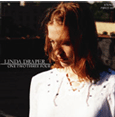
Kramer has worked within all sorts of musical contexts, but he's done some of his most impressive production work with musicians who have a taste for quiet atmospheres, like Low, Galaxie 500, and currently Linda Draper. Draper is a more straightforward folk-pop songwriter than those other acts, but, as witnessed on her fourth album One Two Three Four, her songs carry with them a very haunting atmosphere, especially when recorded and presented in such a stark yet delicate way. Production can help present songs from their best angle, but what really makes One Two Three Four so impressive is Draper's talents as a singer and a songwriter. Her music seems simple – a woman singing pretty, gentle songs about love over guitar or piano. But their effect is definitely not simple. Draper has a uniquely affecting singing voice – powerful even when quiet. And her songs contain both particularly fine, atypical melodies and lyrics that probe human endeavors in a bitterly honest way. The perspective is often bleak, but at the same time filled with understanding. There's jilted lovers, criminals and betrayers galore – but they're us, not strangers. It's very human music, but also with an intoxicating sort of presence to it. – dave heaton
Goldspot, Tally of the Yes Men (Union)
"Songcraft" is a word that comes up a lot in music reviews, but it's a word I keep fixating on when thinking about Tally of the Yes Men, the terrific debut album from the L.A. band Goldspot. As with, say, the Pernice Brothers, Goldspot have a truly impressive handle on song construction, on crafting catchy melodies and setting them in the right context. Their songs communicate emotions – generally a feeling of being lost in the world ("I feel like I'm drowning this time / the world seems to laugh out loud"), sometimes coupled with the feeling of being saved, or at least the hope of being saved by someone. Yet those emotions are closely tied to the strength of the melodies; you feel what they're singing and playing because of how they're doing it, not just because of the words themselves. Musically, Goldspot's streamlined, modern pop-rock could be comfortably placed somewhere along a timeline of post-The Bends alternative rock. It's not hard to hear both Thom Yorke and Jeff Buckley in lead singer Siddhartha's voice, or to hear the casual atmospherics of both Radiohead and their American contemporaries Granddaddy in Goldspot's sound, whether all of this is there intentionally or not. Yet there's also a strong influence of bands from the decade before. The Smiths, in particular, emerge here and there, most obviously on "It's Getting Old". But it's the Smiths' melodic approach that Goldspot seems to be drawing from, not Morrissey's high drama or the group's political bent. While listening to a melody as perfect as those on the catchy first track "Rewind" or the stark ballad "So Fast", you get the sense that Goldspot have spent a lot of time listening to songs by bands who fit gorgeous melodies over rock guitars, taking notes and waiting for the chance to unleash their own powerful songs on unsuspecting ears. That time is now, and Tally of the Yes Men is impressive indeed. – dave heaton
Hobotalk, Notes on Sunset (Circular Records)
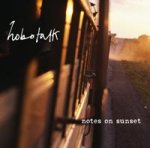
Now that the misadventures with Virgin Records are over, Marc Pilley & Co. can introduce us again to Hobotalk’s beautiful music. Notes On Sunset, the bands’ second full-length album, follow-up to Beauty in Madness, marks Hobotalk’s debut on Scottish independent label Circular Records. The 11 songs on the album are lyrically charming and gently crafted, they are mostly folk based tracks, enriched by vocal harmonies and bittersweet melodies. ‘Little Light’ is a sensitive song full of hope and warmth in which piano and guitar build a simple but effective soundscape; ‘Me & My Mountain’ is an acoustic guitar ballad ideal to listen to when outside is dark and you’re feeling a bit lonely; ‘Letter From A Friend’ is tinged with nostalgia, while ‘In The Arms of Love’ is a dark introspective hymn. Pilley’s voice is clear and firm and projects a soothing calm and a special tenderness. Notes on Sunset is an enchanting, inspiring and invigorating album, a paean to love, loneliness, friendship and beauty. – anna battista
No Wait Wait, self-titled (Chairkicker's Union)

As a member of Pale Horse and Rider, Marc Gartman adds to that group's impressive country roads-meets-big city sound, while occasionally singing one of his own melodic broken-hearted tales. No Wait Wait's self-titled debut album presents us with an album's worth of Gartman's songs, as he fronts a 5-piece (plus extras) band which also includes Low's Alan Sparhawk on guitar. The sound here isn't straight Country & Western, however. This is more of a friendly pop-rock album, with catchy songs more likely to point towards the Beatles than country roadhouses. There's some really catchy songs here, played in raw fashion (the album was recorded at Eric Swanson's great Sacred Heart Studios in Duluth, a former church). Some of the best are right at the start. The opener "Faith and Words" has a big guitar sound and a really pure and emotional melody. "Beaches of the World" is just as good – a mellow number with a Teenage Fanclub-like feeling of longing and some nice power chords. No No Wait are into Neil Young-like ragged guitars, but also Cars-ish keyboards and, overall, a streamlined spunky pop-rock feeling. But there's also clouds of darkness, and some real hurt and meditation in Gartman's lyrics and singing. Overall it's quite a compelling debut, powered by both catchy hooks and grit. – dave heaton
The Pathways, Productivity 7" (RIYL Records)
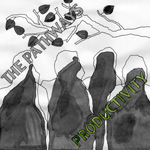
I'm mostly familiar with David Yourdon's songs from Winter Vacation's The Netherlands, 1980 CD. Released on Asaurus, it's one of my favorite albums so far this year, filled with intimate, touching pop songs. The Pathways is apparently Yourdon's main gig. They're more of a rock band, but no less worthy of your attention, judging by their Productivity 7" single. "Productivity", the A-side, has the same real-life anecdote feeling as the Winter Vacation songs, and is just as catchy as those, but more upbeat and fuller, with a dynamite guitar-drums-bass combination driving the melody forward into your brain. The first b-side, "Helen's Housewarming", is just as motivational (and a bit groovy), while the second b-side, "Bruchstuck Eins," is mellow, jazzy, mysterious tune. A great 7" overall, introducing me to a creative band which I can't wait to hear more of. – dave heaton
Robert Pollard, Zoom 7" (Fading Captain Series)
So the first recording Robert Pollard releases after disbanding Guided By Voices is a limited edition 7" with a self-designed collage for its cover. Can't teach an old dog new tricks, huh? Actually, this is something quite new, thankfully. The single opens with "Dr. Fuji and Henry Charleston (Zoom Variation) – not a messed-up lo-fi rock track but an instrumental recording of Pollard playing a melody on guitar in almost an old-fashioned jazz style. That same song, this time titled "Zoom (It Happens All Over the World)", ends the single as well, but this time it's a really amazing, almost country-ish ballad, with a killer melody and passionate singing from Pollard ("where did you go / baby I don't know"). The lyrics are straightforward and open-hearted by Pollard's standards, and overall it sounds nothing like any GBV song ever, while displaying his melodic skill at its best. A great song which gives me hope that the GBV break-up was more than just a name-change, that Pollard really is out to try new things. In between the two versions of "Zoom" there's a typically twisted little pop song and a surprisingly stark and open acoustic love ballad, both of which mutate into weird recorded interviews. Zoom isn't exactly what GBV fans are expecting, and that bodes well for the future. – dave heaton
Verve Remixed 3 (Verve)
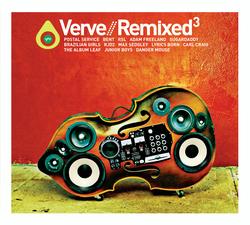
On paper Verve Remixed 3 sounds like it'd be just another album, adding to the clutter at your local record store. How many times do old jazz classics have to be remixed, and what else can be done to them? And why bother? The album itself offers a compelling answer to that last question, or at least in places it does. As the creators of the Verve Remixed series admit in the liner notes, they had to "push the limits of the remix idea" and work with interesting producers if they wanted to keep the series going. Verve Remixed 3 succeeds by containing a handful of remixes by producers who really get the emotions of the original songs, but also aren't afraid to mess around with the sounds in more interesting ways than just speeding them up and adding beats. The compilation's high points include two winning takes on Nina Simone songs; both place her voice in electronic atmospheres that warmly complement the original songs. The Album Leaf quietly surrounds "Lilac Wine" with carefully arranged textures both sad and pretty, while the Postal Service place Simone's "Little Girl Blue" in a very typical Postal Service context, but surprisingly make it work, mostly by knowing not to overshadow her voice and by hearing the sadness in their own beats. RJD2's remix of Astrud Gilberto's "The Gentle Rain" is similarly both melancholy and energetic – while RJ fans will notice that the song is more or less a retread for him, as he's used the song extensively before, it's as impressive now as it was originally. Junior Boys' remix of Billie Holiday's "Yesterdays" is yet another impressive recasting of a sad song in a more modern context, while Danger Mouse hears the soulful yearning in Dinah Washington's "Baby, Did You Hear?" and lets it thrive, while also turning it into a fuzzy near-dance track. The way that he simultaneously clouds over the original and lets it shine is truly interesting. Of the more club-oriented remixes, the most outstanding by far is Lyrics Born's unleashed funk-up of Jimmy Smith's already funky "Stay Loose." And if the rest of Verve Remixed 3's 13 tracks – including contributions from Carl Craig, Bent, Max Sedgley aren't quite as attention-grabbing, they're still all at least pleasant and easy on the ears, with few of the remixers falling down the cliché-ridden path you might expect. – dave heaton
Copyright (c) 2005 erasing clouds |
|